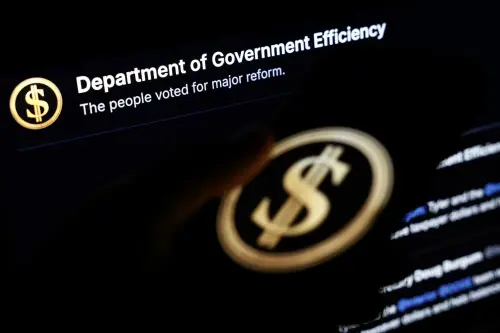Content from the Brookings Doha Center is now archived. In September 2021, after 14 years of impactful partnership, Brookings and the Brookings Doha Center announced that they were ending their affiliation. The Brookings Doha Center is now the Middle East Council on Global Affairs, a separate public policy institution based in Qatar.
Egyptians are getting angry. Their anger, more often than not, is
directed towards the regime of the president Hosni Mubarak, which is
renowned for its combination of repression, mismanagement and longevity.
The novelist Alaa al Aswany remarked recently: “It’s a turning point in
Egyptian history. We are in a very similar moment to 1949.” Three years
after 1949, there was a revolution. An old, decaying order had reached
its end point, as most old, decaying orders eventually do.
But Egypt, today, is a bit of an odd case. Economic indicators tell a different story – one of a country attracting investment, privatising industry, reducing the deficit and otherwise embracing difficult reforms. The prime minister Ahmed Nazif’s cabinet of technocrats, which has overseen annual GDP growth of around 7 per cent, draws constant plaudits from international financial institutions. In 2008, the World Bank’s Doing Business report named Egypt the world’s top reformer.
This is an appealing model, although not necessarily a new one. For western powers skittish about the kind of uninformed choices Arabs might make if given the opportunity to vote, sequentialism provides an attractive alternative – focus on the economy now, worry about political reform later.
Egypt’s progress is not limited to economic indicators, as intangible as they often are. The literacy rate has jumped to 72 per cent. Life expectancy has seen a dramatic increase. The fertility rate is down to about three births, while infant mortality has been more than halved since 1990. To those who argue that Egypt could – and should be – a lot better than it is, the autocrat-technocrats retort, not entirely without reason, that it could be a lot worse.
These statistics, however, miss the point. Yes, Egyptians are better educated and more connected to the world around them than ever before. But, if anything, it is precisely this success, however modest, that suggests the status quo is not likely to last.
Systemic change, whether in the form of revolution or managed democratic transition, is often a product of improved living standards, which, in turn, fuel a rise in expectations. People have more (or are at least aware that others do), so they want more. More importantly, because they’re educated, they believe they have the right to want more.
It also happens to be the case that the Egyptian government seems rather clueless, or, worse, careless, when it comes to redistributing the gains of a purportedly booming economy. Economic inequality remains disturbingly high. But perceived inequality – in an age when businessmen join the ruling party, “win” a parliamentary seat and acquire immunity – is even worse.
So while sequentialism works – China, for one, appears to be managing it quite well – it doesn’t work forever. In any sequence, something must come after what came before. And, unlike the World Bank or western governments, Egyptians aren’t willing to wait patiently for the right time. While Mr Nazif’s cabinet has been courting business and investment, unrest in Egypt has risen to unprecedented levels.
According to a Solidarity Centre report published earlier this year, from 2004 to 2008, more than 1.7 million Egyptian workers participated in over 1,900 labour-related protests. The riots, the strikes and the sit-ins have gone largely unnoticed by the West, in part because they do not appear to be explicitly political – at least not yet.
It is interesting, then, that observers so often fault Egyptians for their apparent passivity. This, conveniently, allows western policy makers to persuade themselves that Egypt will not become another Iran or another, well, Egypt, circa 1952. Egyptians might want change, so the thinking goes, but they don’t seem particularly interested in actually doing anything.
But, again, the numbers belie such claims. The short-lived “Arab spring” in the first half of 2005, after all, saw Egypt’s first ever mass-mobilisation in support of democracy, with over 150,000 participating in protests, demonstrations and campaign rallies. Presumably that counts (and, presumably, suggests that American pressure does, in fact, matter).
More recently, Egypt’s notoriously fractious opposition seems bolder and more energetic. There has been a flurry of coalition building and shuttle diplomacy between Egypt’s various parties and movements. The National Association for Change (NAC), led by the former IAEA chief Mohammed ElBaradei, has launched a grassroots campaign in support of seven reform demands, which include an end to emergency law and an unrestricted right to contest presidential elections. As of July 25, the petition had garnered over 248,000 signatures. Impressively, the Muslim Brotherhood, which joined the campaign, claims to have collected 165,000 of them in just 18 days.
All of this suggests that there is, today, a critical mass for substantive change. The lines between economic and political reform are increasingly blurred, replaced by an enveloping sense that too much has gone wrong for too long. In a way, by focusing on western demands for economic restructuring – and the personal enrichment that has accompanied it – Egypt’s ruling elites have become almost comically out of touch with their own people. While they continue emphasising their economic bona fides to the few who still care to listen, their own citizens are angry, growing angrier, and – more importantly – doing something about it.
The Brookings Institution is committed to quality, independence, and impact.
We are supported by a diverse array of funders. In line with our values and policies, each Brookings publication represents the sole views of its author(s).



Commentary
Op-edIn Egypt, Mubarak’s Regime May Be a Victim of Its Own Success
July 29, 2010